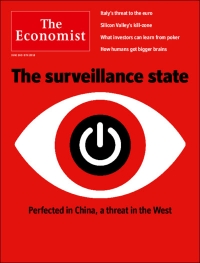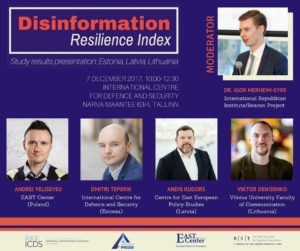 Artificial intelligence will reshape the global order, says analyst Nicholas Wright, who predicts a new era of competition between digital authoritarianism and liberal democracy for Foreign Affairs:
Artificial intelligence will reshape the global order, says analyst Nicholas Wright, who predicts a new era of competition between digital authoritarianism and liberal democracy for Foreign Affairs:
Some countries are already moving in this direction. China has begun to construct a digital authoritarian state by using surveillance and machine learning tools to control restive populations, and by creating what it calls a “social credit system.” Several like-minded countries have begun to buy or emulate Chinese systems. Just as competition between liberal democratic, fascist, and communist social systems defined much of the twentieth century, so the struggle between liberal democracy and digital authoritarianism is set to define the twenty-first.
Toward a New Strategic Paradigm to Combat Disinformation
 Disinformation, misinformation, and social media hoaxes have evolved from a nuisance into high-stakes information war, say analysts Jonathon Morgan and Renee DiResta. State actors with geopolitical motivations, ideological true believers, non-state violent extremists, and economically-motivated enterprises are able to manipulate narratives on social media with ease, and it’s happening each and every day, they write for Just Security:
Disinformation, misinformation, and social media hoaxes have evolved from a nuisance into high-stakes information war, say analysts Jonathon Morgan and Renee DiResta. State actors with geopolitical motivations, ideological true believers, non-state violent extremists, and economically-motivated enterprises are able to manipulate narratives on social media with ease, and it’s happening each and every day, they write for Just Security:
Traditional analysis of propaganda and disinformation has focused fairly narrowly on understanding the perpetrators and trying to fact-check the narratives (fight narratives with counter-narratives, fight speech with more speech). Today’s information operations, however, are materially different – they’re computational. They’re driven by algorithms and are conducted with unprecedented scale and efficiency. To push a narrative today, content is quickly assembled, posted to platforms with large standing audiences, targeted at those most likely to be receptive to it, and then the platform’s algorithms are manipulated to make the content go viral (or at least, to make it easily discoverable).
“It’s time to change our way of thinking about propaganda and disinformation: it’s not a truth-in-narrative issue, it’s an adversarial attack in the information space,” Morgan and DiResta contend. “It’s critical for individuals, for industry, and for democracy to move toward a new strategic and collaborative paradigm.” RTWT







